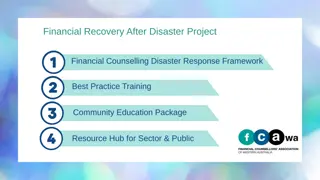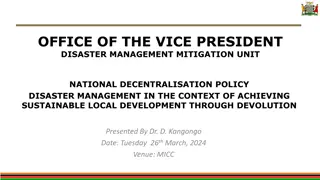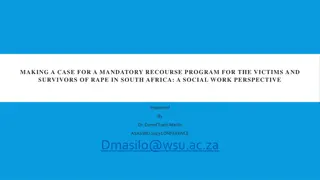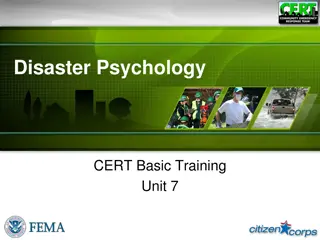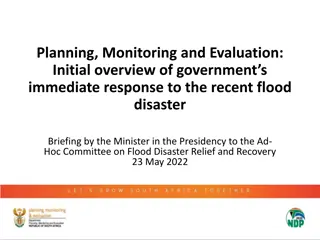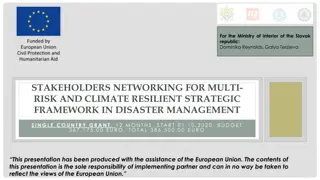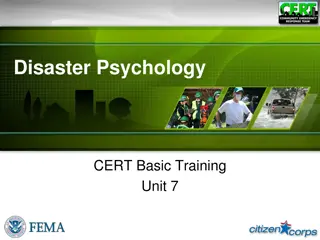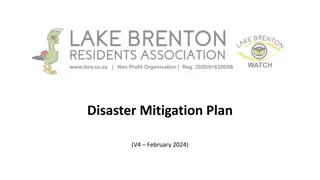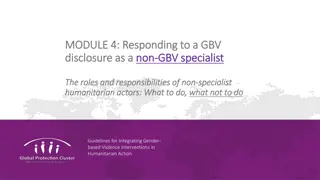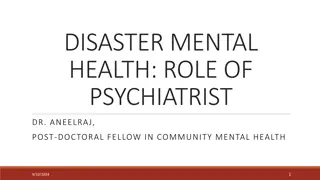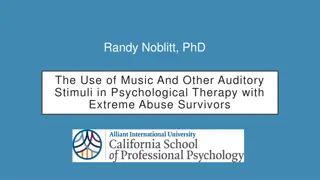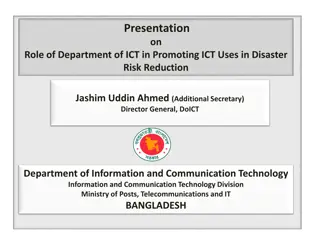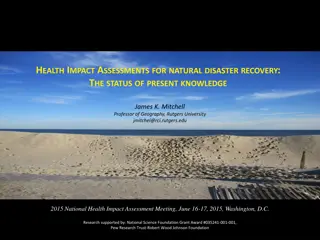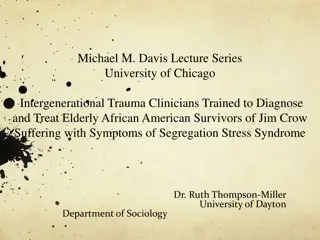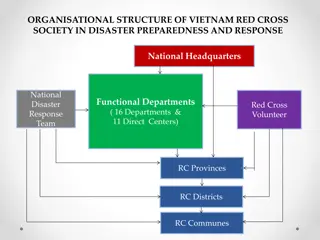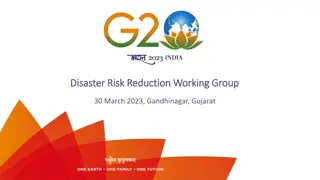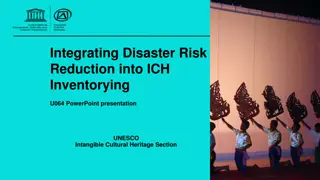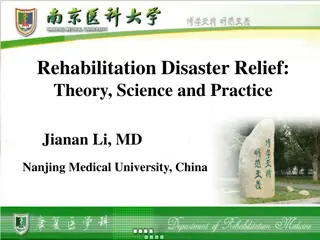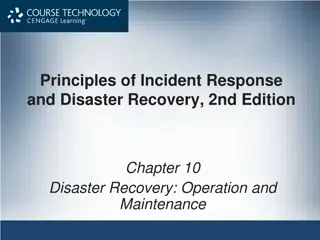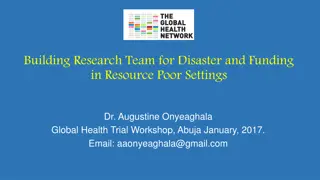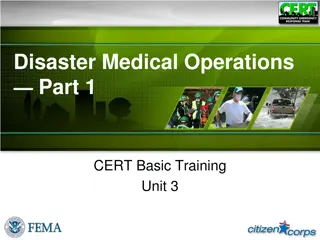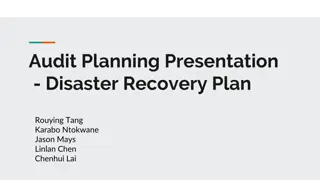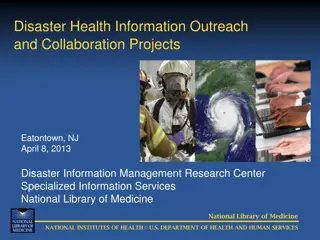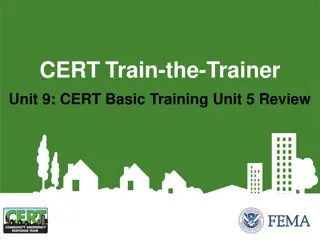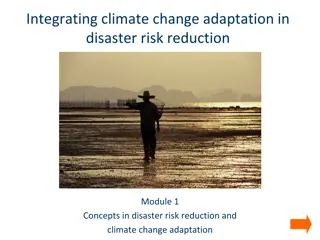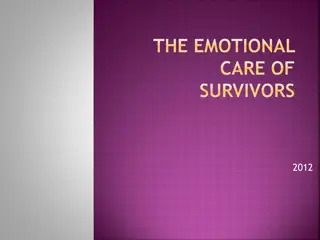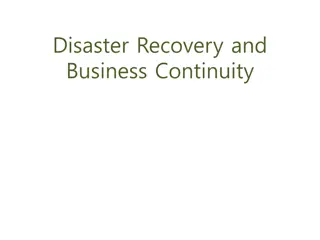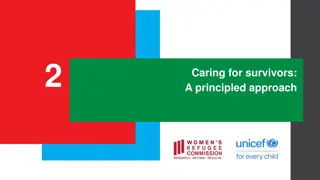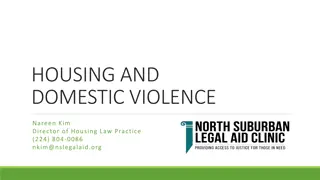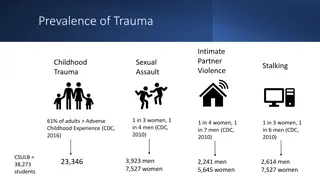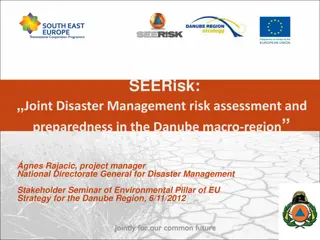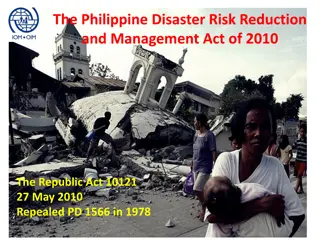International experience in the field of Disaster-related Statistics
Disaster-related statistics encompass data on disaster occurrences, impacts, risk assessment, and post-disaster assessments. The Sendai Framework for Disaster Risk Reduction and the 2030 Agenda for Sustainable Development set global targets and indicators for monitoring disaster risk reduction. Vari
7 views • 6 slides
Understanding Disaster Management Cycle and Phases
Disaster management encompasses planning, organizing, and implementing measures to prevent, reduce, and respond to disasters effectively. The disaster management cycle includes phases such as mitigation, preparedness, response, and recovery. The aim is to reduce potential losses, provide assistance
4 views • 15 slides
Disaster Management and Local Development Through Devolution
The presentation outlined the importance of disaster management in the context of achieving sustainable local development through devolution. It emphasized the need for effective subnational planning, mainstreaming of disaster risk reduction, and financing for disaster relief. The concept of devolut
5 views • 21 slides
Impact of Family Violence on Housing and Support Services in Victoria
Family violence is a significant factor leading to homelessness in Victoria, particularly affecting women and young individuals. Safe at Home programs provide victim-survivors with support to remain in their homes while the perpetrator is removed. Brokerage services, such as flexible support package
5 views • 24 slides
Financial Recovery After Disaster Project: Comprehensive Framework for Community Resilience
This project focuses on financial recovery after disasters through financial counseling, disaster response frameworks, best practice training, and community education resources. It emphasizes understanding disaster risk governance, fostering individual responsibility, and identifying community champ
6 views • 5 slides
Disaster Management and Sustainable Local Development Through Devolution
The presentation explores the integration of disaster management into subnational planning for achieving sustainable local development through devolution. It emphasizes the importance of decentralization, mainstreaming disaster risk reduction, urban areas' resilience, and financing for disaster reli
3 views • 21 slides
Mandatory Recourse Program for Rape Survivors in South Africa: Social Work Perspective
Addressing the alarming rates of rape and sexual violence in South Africa, this paper advocates for the implementation of a mandatory recourse program to support victims and survivors. Highlighting the current lack of mandatory support for survivors, it emphasizes the importance of immediate recours
1 views • 10 slides
Understanding Disaster Psychology and Trauma Management
Delve into the complexities of disaster psychology and trauma management in CERT Basic Training Unit 7. Explore topics such as recognizing emotional environments, alleviating stress for survivors and rescuers, and identifying psychological and physiological symptoms of trauma. Learn how to support t
1 views • 22 slides
Understanding Intimate Partner Violence and Brain Injury Connections
The link between intimate partner violence (IPV) and brain injury is significant, with studies showing a high prevalence of brain injuries among IPV survivors, particularly women. Common types of IPV causing brain injury include hits to the head, strangulation, and banging the head against objects.
1 views • 23 slides
Disaster Resilience Strategy in Developing Countries Vulnerable to Natural Disasters
The IMF's policy paper highlights key challenges faced by small states in building resilience, such as under-investment and donor support post-disaster rather than pre-disaster. The Disaster Resilience Strategy (DRS) emphasizes three pillars for intervention: post-disaster resilience, financial resi
0 views • 11 slides
Government's Immediate Response to Recent Flood Disaster: Overview and Assessment
Understanding the background and context of the recent flood disaster in KwaZulu-Natal (KZN) and other affected areas, this briefing outlines the government's quick response, including the declaration of a national state of disaster, coordination efforts, and actions taken by various government bodi
1 views • 35 slides
Stakeholders Networking for Multi-Risk and Climate Resilient Disaster Management in Slovakia
This project, funded by the European Union, aims to enhance emergency preparedness and response in Slovakia by addressing institutional capacity, coordination, and technology gaps. The goal is to strengthen risk assessment methodologies, involve various stakeholders, and develop disaster-resilient m
1 views • 5 slides
Understanding Disaster Psychology and Rescuer Well-Being
Explore the key concepts of disaster psychology, focusing on the emotional environment of survivors and rescuers. Discover ways rescuers can alleviate stress for themselves and survivors. Learn about symptoms of trauma, both psychological and physiological, and actions to enhance team well-being bef
0 views • 22 slides
Lake Brenton Disaster Mitigation Plan Overview
The Lake Brenton Residents Association plays a crucial role in disaster response with defined responsibilities including being the first responder, securing the area, and coordinating with authorities. The Disaster Mitigation Plan for Lake Brenton outlines roles, organizational structure, procedures
1 views • 20 slides
Guidelines for Survivor-Centered Approach in Responding to Gender-Based Violence
Survivor-centered approach in responding to gender-based violence focuses on creating a supportive environment where survivors' rights are respected, promoting recovery, reinforcing decision-making capacity, and ensuring dignity and respect. It involves addressing victim-blaming attitudes, empowerin
0 views • 28 slides
Understanding the Role of Psychiatrists in Disaster Mental Health
Disaster mental health involves applying psychiatric skills to aid individuals and communities in recovering from the psychological effects of disasters. This includes readiness, response, relief, rehabilitation, recovery, and resilience phases. Mental health professionals play a crucial role in ide
0 views • 30 slides
The Use of Music and Auditory Stimuli in Psychological Therapy with Extreme Abuse Survivors
Extreme abuse survivors often find solace and emotional regulation through music and other auditory stimuli, which can evoke various responses such as containment, identity switching, and flashbacks. Despite being less discussed in clinical literature, these stimuli play a crucial role in therapy wi
0 views • 27 slides
Role of Department of ICT in Disaster Risk Reduction in Bangladesh
The Department of Information and Communication Technology (ICT) in Bangladesh plays a crucial role in promoting the use of ICT for disaster risk reduction. Bangladesh faces numerous catastrophic hazards, making it essential to utilize ICT for warning systems, relief management, and post-disaster ac
0 views • 16 slides
Health Impact Assessments for Natural Disaster Recovery
The study examines the status of knowledge related to health impact assessments for natural disaster recovery, emphasizing the importance of considering the long-term health impacts of disasters. It highlights how disasters and recovery actions can have lasting consequences on community health and w
0 views • 10 slides
Intergenerational Trauma: Coping Strategies of Elderly African American Survivors of Jim Crow
Exploring coping strategies passed down by survivors of Jim Crow to the next generation, this qualitative research project conducted interviews with nearly 100 elderly African American survivors. Key findings reveal the long-term psychological impact of racially traumatic events and diverse coping m
0 views • 27 slides
Organisational Structure of Vietnam Red Cross Society in Disaster Preparedness and Response
The Vietnam Red Cross Society has a structured organizational setup for disaster preparedness and response, including the National Headquarters, Disaster Management Department, and various functional departments at different levels. The organization has achieved significant results in disaster manag
0 views • 6 slides
Global Initiatives for Disaster Risk Reduction in Gandhinagar
The Disaster Risk Reduction Working Group (DRRWG) in Gandhinagar, Gujarat, is focusing on priorities such as early warning systems, resilient infrastructure, financing, disaster response, and recovery. There is a strong emphasis on the connection between disaster risk reduction and sustainable devel
0 views • 18 slides
Integrating Disaster Risk Reduction into ICH Inventorying for UNESCO
Learn how to apply a community-based approach to inventorying and safeguarding intangible cultural heritage within the context of disasters. This presentation offers frameworks, tools, and exercises to integrate disaster awareness into ICH inventorying and safeguarding practices, emphasizing the imp
0 views • 15 slides
Rehabilitation Disaster Relief: Theory, Science, and Practice
Challenges in Rehabilitation Disaster Relief include lack of extensive rescue capacity, rehab resources and management, fund shortages, and uncoordinated implementation. ISPRM-RDRC outlines past and future actions focusing on the NHV model, mobile rehab teams, international rehab databases, rehab st
0 views • 21 slides
Disaster Recovery Operations and Maintenance Overview
Organizations face key challenges in disaster recovery operations, such as widespread disruptions affecting various levels, communities, and suppliers. Prompt reactions and preparedness are essential to navigate through the phases of a disaster recovery plan - preparation, response, recovery, resump
0 views • 48 slides
Building Research Team for Disaster and Funding in Resource-Poor Settings
Disaster research team building is essential for effective disaster management in resource-poor settings. Dr. Onyeaghala emphasized the importance of competent teams in mitigating, preventing, managing, and monitoring health disasters. The workshop in Abuja highlighted the critical competencies and
0 views • 24 slides
Disaster Medical Operations Part 1 - CERT Basic Training Unit 3
Learn essential skills in disaster medical operations as part of CERT Basic Training Unit 3. Topics covered include treating life-threatening conditions, conducting triage, identifying and treating killers such as airway obstruction, bleeding, and shock. Get insights on approaching survivors, openin
0 views • 26 slides
Disaster Recovery Plan Audit for Berry College
Berry College's Information Technology Disaster Recovery Plan is a vital strategy to ensure the continuity of IT operations in the event of a disaster. This audit plan presentation outlines the objectives, scope, and responsibilities involved in auditing and maintaining the effectiveness of the disa
0 views • 20 slides
Disaster Health Information Outreach and Collaboration Projects: Enhancing Disaster Preparedness
This project by the National Library of Medicine aims to improve access to disaster medicine and public health information for the disaster health workforce through partnerships with various organizations across the United States. Seven projects are awarded annually, focusing on enhancing disaster p
0 views • 15 slides
CERT Basic Training Unit 5 Review: Understanding Disaster Trauma
This review covers the purpose and learning objectives of CERT Basic Training Unit 5, which focuses on examining the psychological effects of disasters on survivors and rescuers. It discusses the steps CERT volunteers can take before, during, and after a disaster, as well as emphasizes the importanc
0 views • 11 slides
A Confidentiality Program Helping Victims Become Survivors
Safe at Home is an address confidentiality program aiding victims of domestic abuse, sexual assault, trafficking, and violent crimes to transition into survivors. It offers services like Substitute Address, Mail Forwarding, and Confidential Voter Registration. Eligible individuals can apply, includi
0 views • 36 slides
Integrating Climate Change Adaptation in Disaster Risk Reduction Module 1
Welcome to the e-Learning module on integrating climate change adaptation in disaster risk reduction. This module covers concepts in disaster risk reduction and climate change adaptation. It is part of a package that includes five modules focusing on vulnerability, disaster risk reduction, climate c
0 views • 29 slides
Supporting Emotional Well-being in Disaster Survivors: Resources and Training
Explore resources from the Missouri Department of Mental Health for providing emotional care to disaster survivors. Learn about stress responses, training programs like Psychological First Aid, and access web resources for disaster readiness. Contact Jenny Wiley, Coordinator of Disaster Services, fo
0 views • 8 slides
Importance of Disaster Recovery and Business Continuity Planning
Disaster recovery and business continuity planning are crucial for businesses to survive major disasters and continue operations. This involves assessing business impacts, creating documentation, and planning for various types of disasters. Failure to plan can lead to significant revenue loss, damag
0 views • 46 slides
Empowering Survivors: A Principled Approach Through Self-Reflection and Values Clarification
Empower survivors by debunking myths, promoting self-reflection, and adopting a survivor-centered approach. Understand the influence of personal values, biases, and behaviors in supporting survivors' recovery and agency. Embrace neutrality, self-awareness, and survivor-centric actions to ensure dign
0 views • 23 slides
Understanding Subsidized Housing Programs for Domestic Violence Survivors
Domestic violence often leads to housing instability, making it crucial for survivors to access safe housing. This article explores the intersection between domestic violence and housing, highlighting the barriers faced by survivors. It delves into the importance of subsidized housing programs, such
0 views • 34 slides
Understanding SBA Disaster Loans for New Castle County, DE
Explore the role of the Small Business Administration in disaster recovery through its loan programs for businesses, homeowners, and renters in New Castle County, DE. Learn about the types of SBA disaster declarations, loan programs offered, limits on loan amounts, and details of the recent New Jers
0 views • 20 slides
Understanding Trauma and Social Reactions in Cases of Violence
This content highlights the prevalence of trauma, including intimate partner violence, childhood trauma, sexual assault, and stalking. It discusses disclosures to friends and family, social reactions survivors may face, victim blame, and the importance of providing support and understanding to survi
0 views • 10 slides
SEERisk: Disaster Management and Preparedness in the Danube Macro-Region
Joint Disaster Management project SEERisk aimed to assess and enhance preparedness in the Danube macro-region, involving multiple stakeholders in environmental disaster risk reduction. The project, led by gnes Rajacic, Project Manager at the National Directorate General for Disaster Management, focu
0 views • 17 slides
Enhancing Disaster Risk Reduction in the Philippines
The Philippine Disaster Risk Reduction and Management Act of 2010, also known as Republic Act 10121, replaced PD 1566 and introduced a proactive approach to disaster management, focusing on risk reduction and building community resilience. The new law aims to transform and reform disaster response b
0 views • 26 slides




